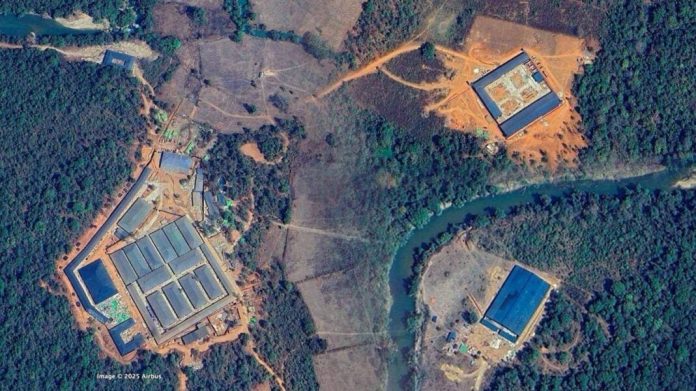A growing network of online scam operations is spreading across the forested regions of southern Shan State, particularly in Laihka, Mong Kung, and Kyethi townships, according to local sources and investigators. These illicit activities, shielded by armed groups and militias, are evading authorities and worrying residents. Laikha, Mong Kung, and Kyethi are located 90-165 miles (144-265 km) east of the Shan State capital Taunggyi.
“Between Kyethi and Laihka, at least 2,000 Chinese nationals operate these scams under armed group protection,” a resident told SHAN on the condition of anonymity. “When authorities attempt crackdowns, they simply retreat deeper into militia-controlled territory.”
Since early 2025, scam centers along the Nam Taung (Nam Teng) River have multiplied, with hundreds of foreign nationals, mostly Chinese, reportedly engaged in illegal online gambling and cyber fraud.
“The moment one location is exposed, they relocate to another village,” the resident added. “No one can stop them.”
The Wan Pang village tract in Laihka Township has emerged as a key hub for these operations, effectively barring state-level regime officials from intervening. The area lies at the intersection of Laihka, Mong Kung, and Kyethi townships, an area of the country under the influence of the Shan State Progress Party (SSPP) and its armed wing, the Shan State Army (SSA).
After a crackdown in Nam Sang Township, where over 700 scammers were arrested, many detainees were allegedly transferred to Pang Hlan, a Mark Kieng militia-controlled area between Mong Nai and Nam Sang in March. Locals report that new scam operations have since resurfaced in Mong Nai, which is located 105 miles (168 km) southeast of Taunggyi.
In a June 10 directive, the SSPP reiterated its ban on members participating in drug trafficking, online scams, and arms smuggling, warning of disciplinary action and potential extradition to Myanmar or Chinese authorities. However, sources indicate that enforcement remains weak, with some groups continuing operations in remote areas.
Despite official denials, the persistence of these syndicates highlights the challenges of combating organized cybercrime in conflict-affected regions.



